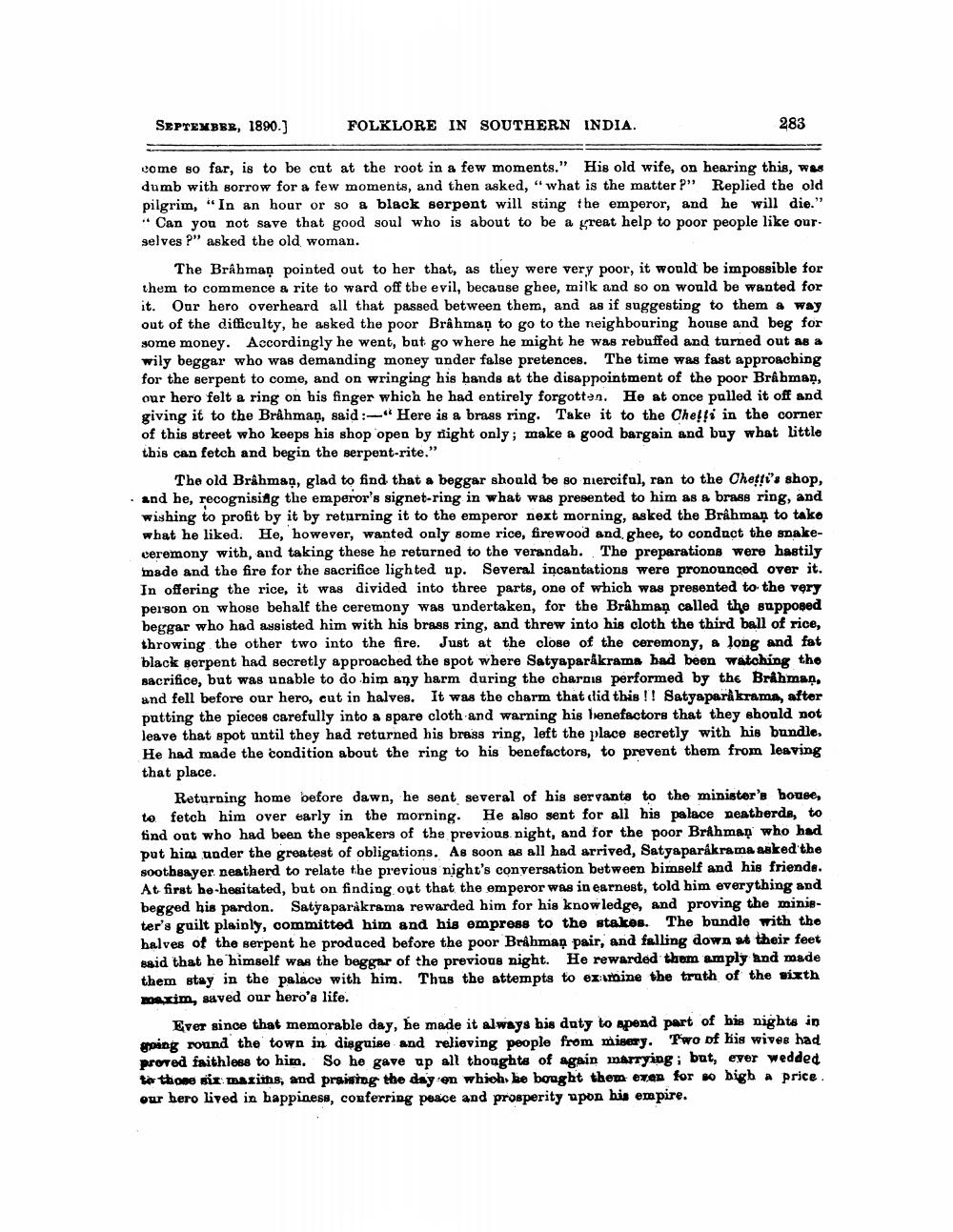________________
SEPTEMBER, 1890.)
FOLKLORE IN SOUTHERN INDIA.
283
come so far, is to be cut at the root in a few moments." His old wife, on hearing this, was dumb with sorrow for a few moments, and then asked, "what is the matter?” Replied the old pilgrim, "In an hour or so & black serpent will sting the emperor, and he will die."
Can you not save that good soul who is about to be a great help to poor people like our selves ?" asked the old woman.
The Brâhmaņ pointed out to her that, as they were very poor, it would be impossible for them to commence a rite to ward off tbe evil, because ghee, milk and so on would be wanted for it. Our hero overheard all that passed between them, and as if suggesting to them a way out of the difficulty, he asked the poor Brahmaņ to go to the neighbouring house and beg for some money. Accordingly he went, but go where he might he was rebuffed and turned out as a wily beggar who was demanding money under false pretences. The time was fast approaching for the serpent to come, and on wringing his hands at the disappointment of the poor Brabman, our hero felt a ring on his finger which he had entirely forgotten. He at once pulled it off and giving it to the Brâhman, said :-"Here is a brass ring. Take it to the Chelli in the corner of this street who keeps his shop open by night only; make a good bargain and buy what little this can fetch and begin the serpent-rite."
The old Brâhmaq, glad to find that a beggar should be so nierciful, ran to the Chetti's shop, • and he, recognising the emperor's signet-ring in what was presented to him as a brass ring, and wishing to profit by it by returning it to the emperor next morning, asked the Brahman to take what he liked. He, however, wanted only some rice, firewood and ghee, to conduct the snakeceremony with, and taking these he returned to the verandab. The preparations were hastily made and the fire for the sacrifice lighted up. Several incantations were pronounced over it. In offering the rice, it was divided into three parts, one of which was presented to the very person on whose behalf the ceremony was undertaken, for the Brahman called the supposed beggar who had assisted him with his brass ring, and threw into his cloth the third ball of rice, throwing the other two into the fire. Just at the close of the ceremony, a long and fat black serpent had secretly approached the spot where Satyaparåkrama had been watching the sacrifice, but was unable to do him any harm during the charnis performed by the Brahman, and fell before our hero, cut in halves. It was the charm that did this !! Satyaparakrama, after putting the pieces carefully into a spare cloth and warning his lenefactors that they should not leave that spot until they had returned his brass ring, left the place secretly with his bundle, He had made the condition about the ring to his benefactors, to prevent them from leaving that place.
Returning home before dawn, he sent several of his servants to the minister's house, to fetch him over early in the morning. He also sent for all his palace Deatherde, to find out who had been the speakers of the previous night, and for the poor Brahman who had pat him under the greatest of obligations. As soon as all had arrived, Satyaparákrama asked the soothsayer neatherd to relate the previous night's conversation between bimself and his friends. At first he-hesitated, but on finding out that the emperor was in earnest, told him everything and begged his pardon. Satyaparåkrama rewarded him for his knowledge, and proving the minister's guilt plainly, committed him and his emprese to the stakes. The bundle with the balves of the serpent he produced before the poor Brahman pair, and falling down at their feet said that he himself was the beggar of the previous night. He rewarded them amply and made them stay in the palace with him. Thus the attempts to examine the truth of the sixth muxim, saved our hero's life.
Ever since that memorable day, he made it always his duty to spend part of his nights in going round the town in disguise and relieving people from misery. Two of his wives had prored faithless to him. So he gave up all thoughts of again marrying; but, eyer wedded to those six marins, and praising the day on which he bought them even for a high a price our hero lived in happiness, conferring peace and prosperity upon his empire.




